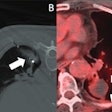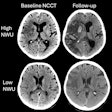Researchers from the University of Illinois used CT to produce a detailed map of brain regions that contribute to emotional intelligence, or the ability to process emotional information. They found a significant overlap between general intelligence and emotional intelligence in a group of more than 150 Vietnam War veterans.
In a study that appeared in Social Cognitive and Affective Neuroscience, the researchers pooled data from CT scans of the veterans' brains to produce a collective 3D map of the cerebral cortex, dividing the composite brain into voxels. They compared the cognitive abilities of patients with damage to a particular voxel or cluster of voxels with those of patients without injuries in those brain regions. This allowed the researchers to identify brain areas essential to specific cognitive abilities and those that contribute to general intelligence, emotional intelligence, or both.
Specific regions in the frontal cortex and parietal cortex were important to both general and emotional intelligence, according to lead author Aron Barbey, PhD, from the Beckman Institute for Advanced Science and Technology, and colleagues. The frontal cortex regulates behavior, processes feelings of reward, and plays a role in attention, planning, and memory. The parietal cortex helps integrate sensory information and contributes to coordination of the body and language processing.
The findings counter the historic belief that general intelligence is distinct from social and emotional intelligence, Barbey noted. The study results could help scientists and clinicians better understand and treat brain injuries, in addition to illustrating the interdependence of general and emotional intelligence.




















